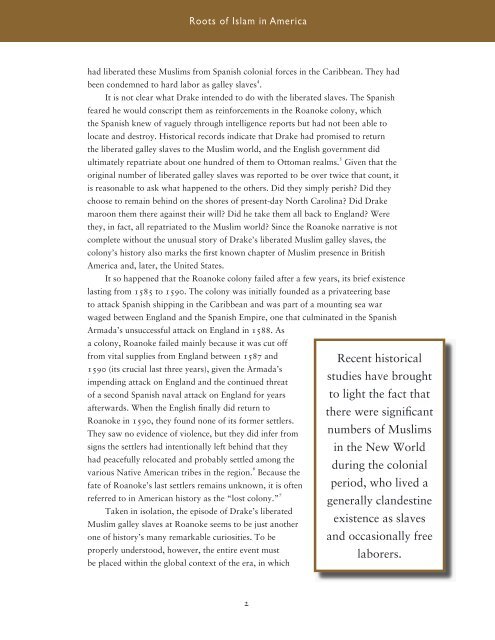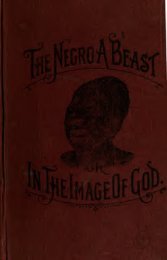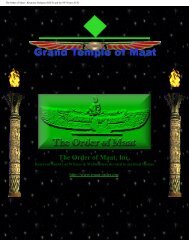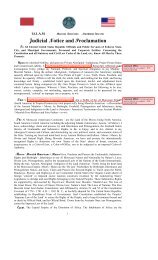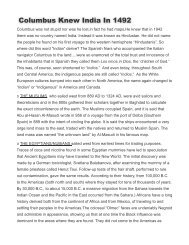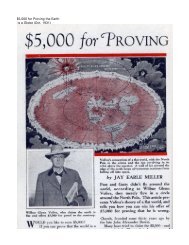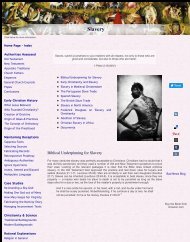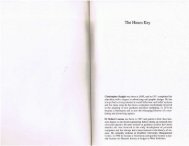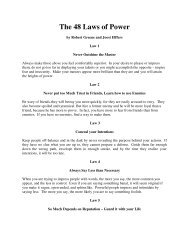Turks,Moors,& Moriscos in Early America
You also want an ePaper? Increase the reach of your titles
YUMPU automatically turns print PDFs into web optimized ePapers that Google loves.
!""#$%"&%'$()*%+,%-*./+0)<br />
had liberated these Muslims from Spanish colonial forces <strong>in</strong> the Caribbean. They had<br />
been condemned to hard labor as galley slaves 4 .<br />
It is not clear what Drake <strong>in</strong>tended to do with the liberated slaves. The Spanish<br />
feared he would conscript them as re<strong>in</strong>forcements <strong>in</strong> the Roanoke colony, which<br />
the Spanish knew of vaguely through <strong>in</strong>telligence reports but had not been able to<br />
locate and destroy. Historical records <strong>in</strong>dicate that Drake had promised to return<br />
the liberated galley slaves to the Muslim world, and the English government did<br />
ultimately repatriate about one hundred of them to Ottoman realms. 5 Given that the<br />
orig<strong>in</strong>al number of liberated galley slaves was reported to be over twice that count, it<br />
is reasonable to ask what happened to the others. Did they simply perish? Did they<br />
choose to rema<strong>in</strong> beh<strong>in</strong>d on the shores of present-day North Carol<strong>in</strong>a? Did Drake<br />
maroon them there aga<strong>in</strong>st their will? Did he take them all back to England? Were<br />
they, <strong>in</strong> fact, all repatriated to the Muslim world? S<strong>in</strong>ce the Roanoke narrative is not<br />
complete without the unusual story of Drake’s liberated Muslim galley slaves, the<br />
colony’s history also marks the first known chapter of Muslim presence <strong>in</strong> British<br />
<strong>America</strong> and, later, the United States.<br />
It so happened that the Roanoke colony failed after a few years, its brief existence<br />
last<strong>in</strong>g from 1585 to 1590. The colony was <strong>in</strong>itially founded as a privateer<strong>in</strong>g base<br />
to attack Spanish shipp<strong>in</strong>g <strong>in</strong> the Caribbean and was part of a mount<strong>in</strong>g sea war<br />
waged between England and the Spanish Empire, one that culm<strong>in</strong>ated <strong>in</strong> the Spanish<br />
Armada’s unsuccessful attack on England <strong>in</strong> 1588. As<br />
a colony, Roanoke failed ma<strong>in</strong>ly because it was cut off<br />
from vital supplies from England between 1587 and<br />
1590 (its crucial last three years), given the Armada’s<br />
impend<strong>in</strong>g attack on England and the cont<strong>in</strong>ued threat<br />
of a second Spanish naval attack on England for years<br />
afterwards. When the English f<strong>in</strong>ally did return to<br />
Roanoke <strong>in</strong> 1590, they found none of its former settlers.<br />
They saw no evidence of violence, but they did <strong>in</strong>fer from<br />
signs the settlers had <strong>in</strong>tentionally left beh<strong>in</strong>d that they<br />
had peacefully relocated and probably settled among the<br />
various Native <strong>America</strong>n tribes <strong>in</strong> the region. 6 Because the<br />
fate of Roanoke’s last settlers rema<strong>in</strong>s unknown, it is often<br />
referred to <strong>in</strong> <strong>America</strong>n history as the “lost colony.” 7<br />
Taken <strong>in</strong> isolation, the episode of Drake’s liberated<br />
Muslim galley slaves at Roanoke seems to be just another<br />
one of history’s many remarkable curiosities. To be<br />
properly understood, however, the entire event must<br />
be placed with<strong>in</strong> the global context of the era, <strong>in</strong> which<br />
Recent historical<br />
studies have brought<br />
to light the fact that<br />
there were significant<br />
numbers of Muslims<br />
<strong>in</strong> the New World<br />
dur<strong>in</strong>g the colonial<br />
period, who lived a<br />
generally clandest<strong>in</strong>e<br />
existence as slaves<br />
and occasionally free<br />
laborers.<br />
2


